
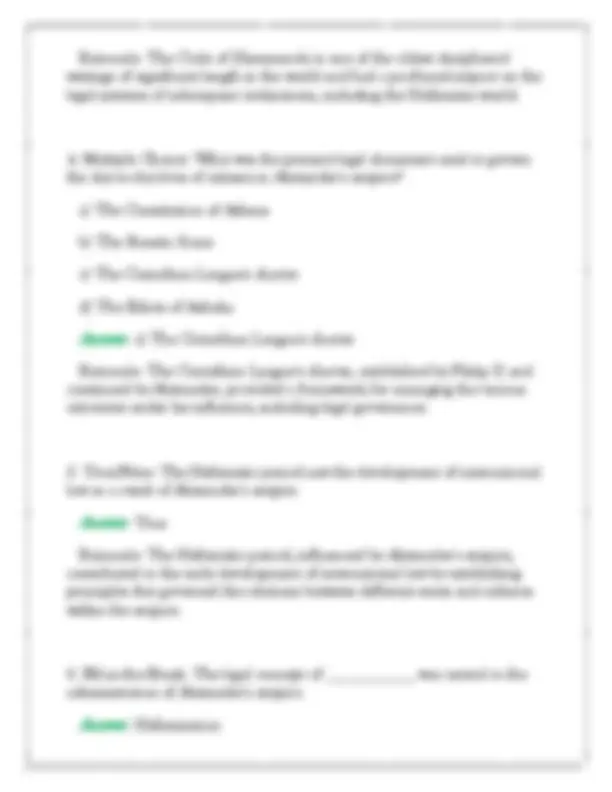
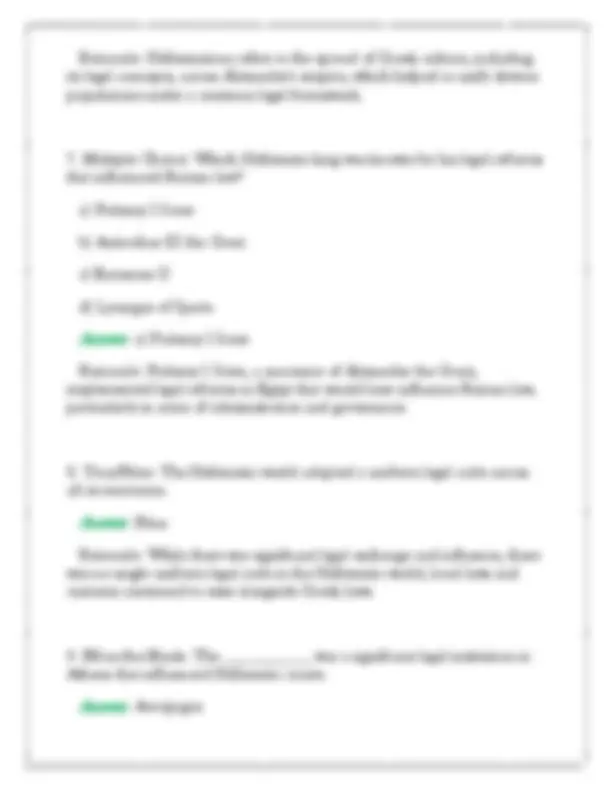
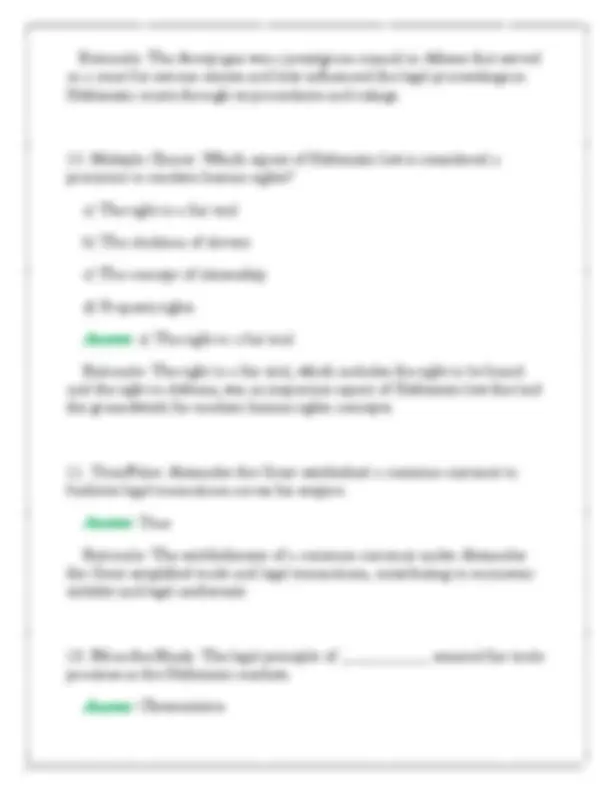
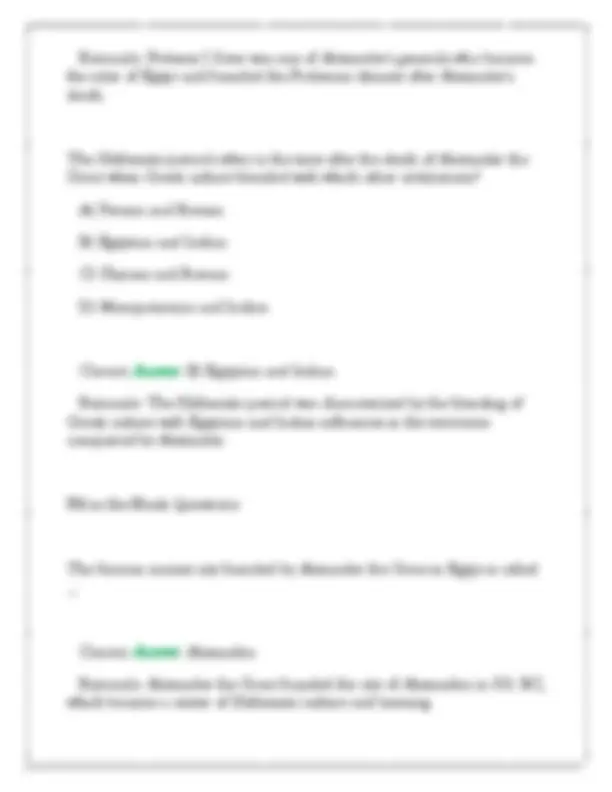

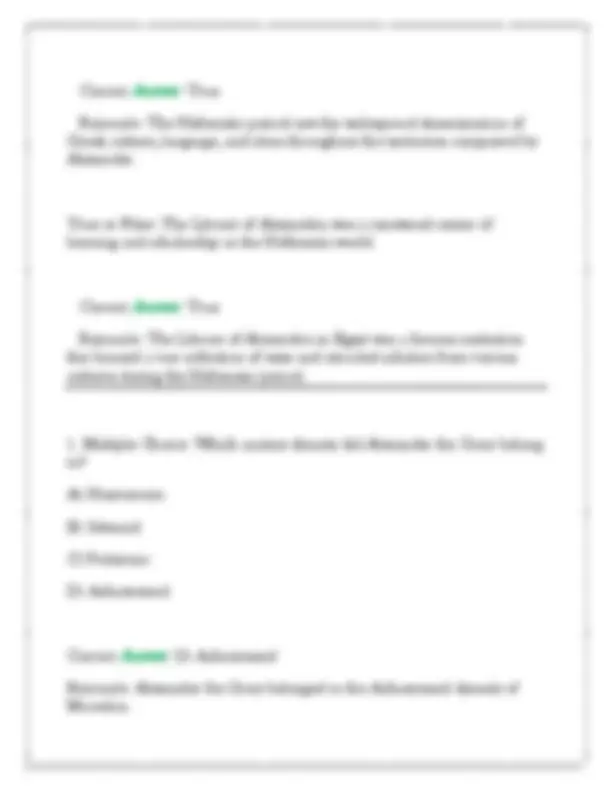
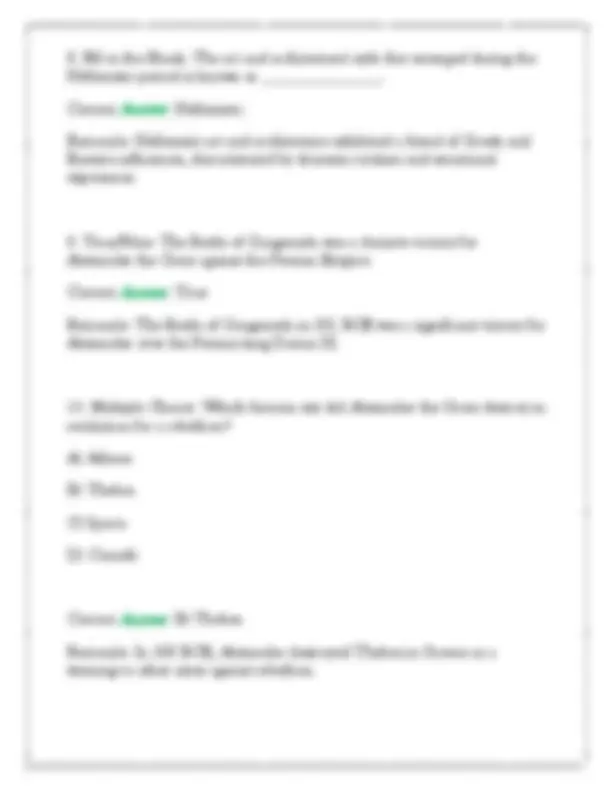
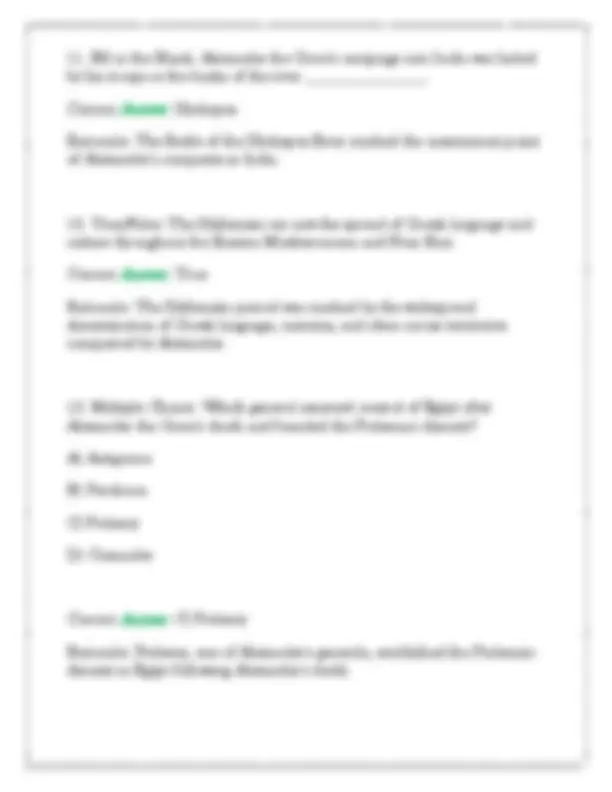



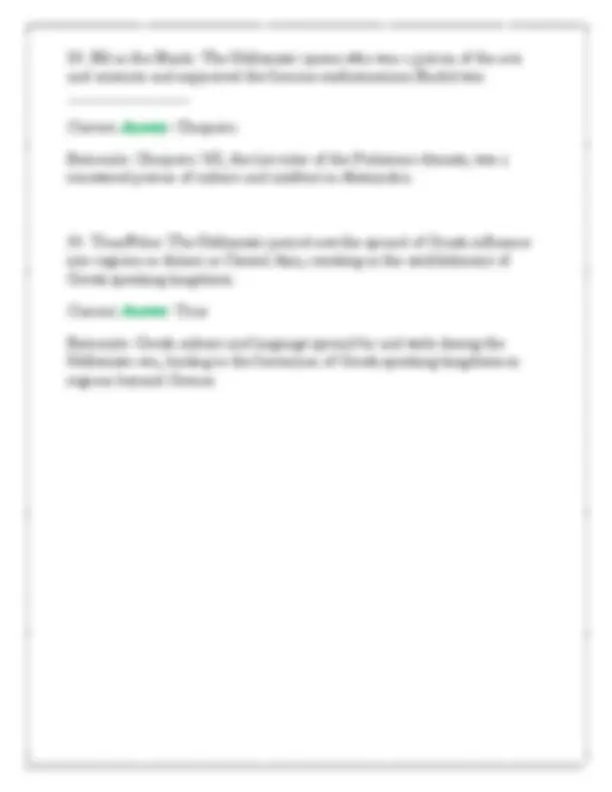


Study with the several resources on Docsity

Earn points by helping other students or get them with a premium plan


Prepare for your exams
Study with the several resources on Docsity

Earn points to download
Earn points by helping other students or get them with a premium plan
Community
Ask the community for help and clear up your study doubts
Discover the best universities in your country according to Docsity users
Free resources
Download our free guides on studying techniques, anxiety management strategies, and thesis advice from Docsity tutors
(UNE) ANCH307 Alexander the Great & the Hellenistic World Midterm Exam Guide Q & S 2024(UNE) ANCH307 Alexander the Great & the Hellenistic World Midterm Exam Guide Q & S 2024(UNE) ANCH307 Alexander the Great & the Hellenistic World Midterm Exam Guide Q & S 2024
Typology: Exams
1 / 20

This page cannot be seen from the preview
Don't miss anything!













Rationale: Alexander adopted this administrative policy from the Achaemenid Persians to maintain control over his vast empire, which was crucial for integrating and managing diverse cultures within his territories.
Rationale: Alexander's conquests significantly influenced the legal systems of the Hellenistic world by promoting the fusion of Greek and local laws, leading to the development of new legal frameworks that would endure long after his death.
Rationale: Hellenization refers to the spread of Greek culture, including its legal concepts, across Alexander's empire, which helped to unify diverse populations under a common legal framework.
Rationale: Ptolemy I Soter, a successor of Alexander the Great, implemented legal reforms in Egypt that would later influence Roman law, particularly in areas of administration and governance.
Rationale: While there was significant legal exchange and influence, there was no single uniform legal code in the Hellenistic world; local laws and customs continued to exist alongside Greek laws.
Rationale: The Areopagus was a prestigious council in Athens that served as a court for serious crimes and later influenced the legal proceedings in Hellenistic courts through its procedures and rulings.
Rationale: The right to a fair trial, which includes the right to be heard and the right to defense, was an important aspect of Hellenistic law that laid the groundwork for modern human rights concepts.
Rationale: The establishment of a common currency under Alexander the Great simplified trade and legal transactions, contributing to economic stability and legal uniformity.
Rationale: The Gortyn Code, a legal code from Crete, is one of the earliest examples of written law in the Greek world and influenced the legal systems during the Hellenistic period. Which ancient city did Alexander the Great famously burn to the ground? A) Athens B) Alexandria C) Persepolis D) Rome
Rationale: Alexander the Great burned Persepolis, the capital of the Persian Empire, in 330 BC as a revenge for the Persian invasion of Greece. Who succeeded Alexander the Great as the ruler of the Macedonian Empire after his death? A) Cleopatra B) Julius Caesar C) Ptolemy I Soter D) Xerxes I
Rationale: Ptolemy I Soter was one of Alexander's generals who became the ruler of Egypt and founded the Ptolemaic dynasty after Alexander's death. The Hellenistic period refers to the time after the death of Alexander the Great when Greek culture blended with which other civilizations? A) Persian and Roman B) Egyptian and Indian C) Chinese and Roman D) Mesopotamian and Indian
Rationale: The Hellenistic period was characterized by the blending of Greek culture with Egyptian and Indian influences in the territories conquered by Alexander. Fill-in-the-Blank Questions: The famous ancient city founded by Alexander the Great in Egypt is called _.
Rationale: Alexander the Great founded the city of Alexandria in 331 BC, which became a center of Hellenistic culture and learning.
Rationale: The Hellenistic period saw the widespread dissemination of Greek culture, language, and ideas throughout the territories conquered by Alexander. True or False: The Library of Alexandria was a renowned center of learning and scholarship in the Hellenistic world.
Rationale: The Library of Alexandria in Egypt was a famous institution that housed a vast collection of texts and attracted scholars from various cultures during the Hellenistic period.
Rationale: Alexander the Great belonged to the Achaemenid dynasty of Macedon.
Rationale: Aristotle was the renowned philosopher who taught Alexander the Great during his youth.
Rationale: Alexander's military campaigns extended into the Indian subcontinent, specifically up to the Indus River.
Rationale: Alexander founded the city of Alexandria in Egypt, which became a prominent cultural and intellectual center in the Hellenistic world.
Rationale: Hellenistic art and architecture exhibited a blend of Greek and Eastern influences, characterized by dramatic realism and emotional expression.
Rationale: The Battle of Gaugamela in 331 BCE was a significant victory for Alexander over the Persian king Darius III.
Rationale: In 335 BCE, Alexander destroyed Thebes in Greece as a warning to other cities against rebellion.
Rationale: The Battle of the Hydaspes River marked the easternmost point of Alexander's conquests in India.
Rationale: The Hellenistic period was marked by the widespread dissemination of Greek language, customs, and ideas across territories conquered by Alexander.
Rationale: Ptolemy, one of Alexander's generals, established the Ptolemaic dynasty in Egypt following Alexander's death.
Rationale: Archimedes, known for his contributions to mathematics and engineering, resided in the city of Alexandria during the Hellenistic era.
Rationale: Cleopatra VII formed alliances with the Roman leaders Julius Caesar and Mark Antony in efforts to maintain her rule over Egypt.
Rationale: Justin's "Historiarum Philippicarum" provides a concise account of Alexander the Great's campaigns and their impact.
Rationale: The Pharos of Alexandria was an iconic lighthouse that guided sailors into the city's harbor.
Rationale: Hellenistic philosophy incorporated elements of Eastern thought, leading to the emergence of philosophical movements such as Neoplatonism and Eclecticism.
Rationale: The sculptor of the "Winged Victory of Samothrace" remains unknown, but the statue is a renowned masterpiece of Hellenistic sculpture.
Rationale: Antigonus Monophthalmus, one of Alexander's generals, established the Antigonid dynasty after Alexander's death.
Rationale: Hellenistic astronomers, such as Ptolemy, contributed to the understanding of celestial motions and proposed the geocentric model of the cosmos.
Rationale: Epicurus founded the philosophical school of Epicureanism, which advocated for the pursuit of pleasure and a tranquil life.
Rationale: Cleopatra VII, the last ruler of the Ptolemaic dynasty, was a renowned patron of culture and intellect in Alexandria.
Rationale: Greek culture and language spread far and wide during the Hellenistic era, leading to the formation of Greek-speaking kingdoms in regions beyond Greece.